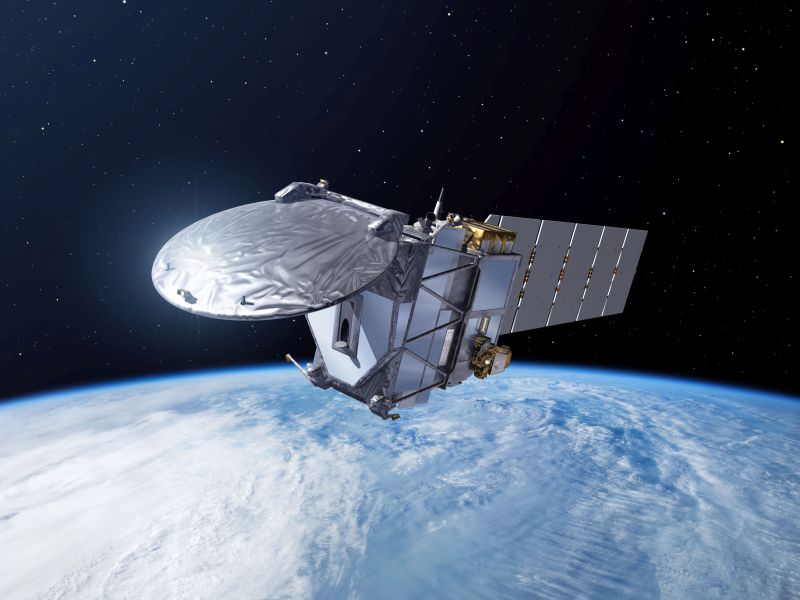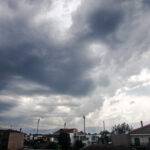The National Observatory of Athens will participate
A series of important missions is planned by European Space Agency (ESA) for 2024. Among them is the “EarthCARE” mission, in which the National Observatory of Athenswith the aim of understanding the interaction between clouds, aerosols and radiation in the Earth’s atmosphere and ultimately better forecasting weather and climate conditions.
His launch earth observation satellite “EarthCARE” (Cloud, Aerosol and Radiation Explorer), which is a consortium between ESA and Japan Aerospace Exploration Agency (JAXA), due in May.
The satellite will investigate the role that clouds and aerosols play in reflecting solar radiation back into Space and trapping the infrared radiation emitted by the Earth’s surface, in order to better understand the evolution of the Earth’s temperature. Observations of the atmosphere will be made using a series of scientific instruments: a high spectral resolution lidar, a Doppler cloud radar and radiation receivers (total and spectral ranges).
“One of the biggest problems we have to solve in climate research is clouds. The numerical models we use for weather forecasting and climate projections suffer from our inability to accurately represent how clouds form and evolve over time. This is because we do not know well the physical processes that govern the interactions between particles, clouds and radiation. EarthCARE is the first satellite that will simultaneously provide us with all the necessary information from Space to decode unknown atmospheric processes that will improve forecasts”, explains the research director of the Institute of Astronomy, Astrophysics, Space Applications and Remote Sensing to APE-MPE ( IAADET) of the National Observatory of Athens, Vassilis Amoiridis.
IAADET will have a significant contribution to the mission, as it has designed and will implement for ESA the ACROSS experiment with the primary objective of calibrating and validating EarthCARE observations. For its implementation, IAADET will make use of the know-how it has already developed in techniques for monitoring the atmosphere from the ground. The experiment is planned to take place in 2025 and 2026 in the Mediterranean, centered on three locations in Greece, Athens, Thessaloniki and Antikythera. The German Aerospace Center DLR will participate in the experiment, the LATMOS Laboratory for Atmospheric, Environmental and Space Observations of the University of Paris and the British research laboratory FAAM with instruments and researchers from different British universities. NASA has also expressed interest in taking part.
“The reason we have chosen the Mediterranean for the experiment is because it is a crossroads of air masses, with transport of smoke from forest fires in the Mediterranean, desert dust from Africa, volcanic ash from Etna, but also anthropogenic and marine suspensions. In addition, we will particularly focus on the observation of extreme phenomena, such as Mediterranean cyclones, to study the mechanisms that influence their evolution“, points out the special scientist of the Observatory and in charge of the experiment, Eleni Marinou.
Already, in recent months, a preparation experiment for ACROSS has been carried out within the framework of the European research infrastructure ACTRIS, in which a consortium of 46 European observatories participates, under the coordination of the German institute TROPOS and IAADET. The scientific teams took measurements on virtual passes of the satellite and developed the necessary procedures for these measurements to be sent automatically and in near real time to ESA’s central servers. ESA’s goal is within the first 45 days of the satellite’s launch in May to have the final validation tests of the satellite’s data made available immediately to users.
EarthCARE’s measurements are expected to be very accurate and this is the focus of the mission, as they will then be widely used in forecasting weather models by the European Center for Medium-Range Weather Forecasts (ECMWF).
As Thanasis Georgiou explains, PhD student at the Observatory specializing in improving predictive weather models with data assimilation techniques, “It is particularly important that EarthCARE focuses on clouds, because there is a big problem in representing clouds in models. So we hope with this particular satellite to have new information about clouds and use it for more realistic predictions.”
Other missions of 2024
ESA’s first mission of 2024 will take place in mid-January (probably on January 17), with the Swedish National Space Agency participating. The mission named “Muninn” will last up to 14 days during which the astronaut, Marcus Wandt (Marcus Wandt) will make its first trip to the International Space Station and take part in microgravity research and training activities. And this mission has Greek participation. The Swedish astronaut is medically supported by the Greek doctor, Adrianos Golemis, while in one of the experiments he will perform, the Greek researcher at the KTH Royal Institute of Technology, Michalis Magos, will collaborate.
SpaceX is expected to launch two Galileo satellites in April, with two more to follow later this year. Galileo is the European satellite navigation system, which enables a multitude of applications such as transport, road, rail and sea, agriculture and rescue operations. Today, the system consists of 28 satellites, which are located at a height of 23,222 kilometers above the Earth. A total of ten first-generation Galileo satellites are due to be launched to complete the formation. They will then be succeeded by the second generation of Galileo, which will offer improved capabilities.
2024 will be the main benchmark for ESA to regain autonomous European access to Space through the long-awaited inaugural flight of Ariane 6. The inaugural flight is timed for the period from mid-June 2024 to the end of July 2024.
The launch of the Proba-3 mission with a launch vehicle of the Indian Space Research Organization is also expected in the summer. The mission includes two small satellites, which will study the Sun’s corona and the surrounding atmosphere. The mission will lift off from India’s Satish Dhawan Space Centre.
In October, the Hera mission to explore the binary asteroid system Gemini-Dimorphos is scheduled to launch, scheduled to be launched by SpaceX from Cape Canaveral in Florida. Hera will provide important information for future asteroid deflection missions and to investigate the geophysics of asteroids, the formation of the Solar System and its evolutionary processes.
Finally, the year will conclude with the expected return to flight of the upgraded Vega-C launcher, which is expected to extend Europe’s autonomy in space by supporting new mission capabilities.




